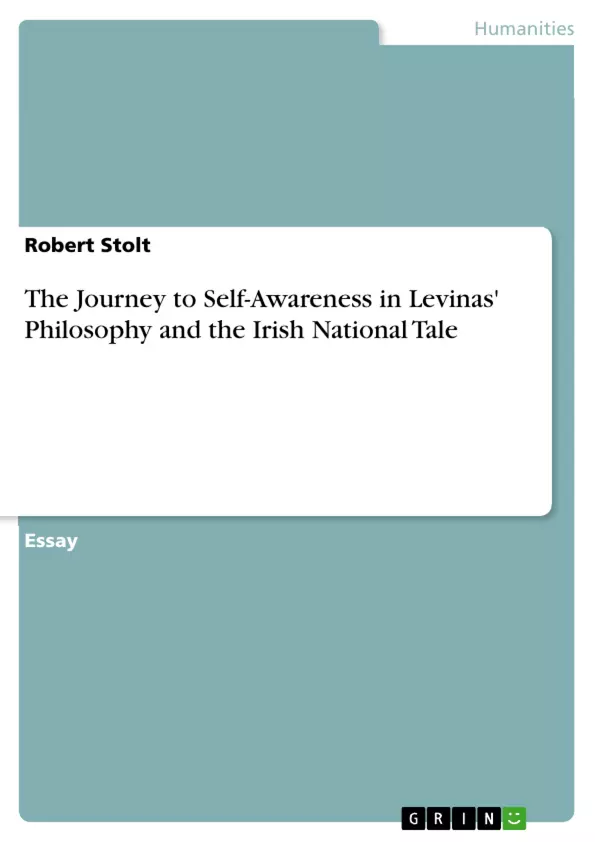Already in ancient times the image of the Other was negatively connoted with the Foreign imagined as a monster creature, dog-headed or monocular, which has manifested itself in the opposition of the ‘civilised’ and the ‘primitive world’. This construct helps integrate the foreign reality into the own cultural horizon of knowledge. This builds the starting point for the thesis of this essay that suggests that only through the unprejudiced encounter with the Other can the Self truly be. The idea derives from Kant’s theory that claims that in order to be ourselves we need to combine with other people (Wohlgemut 2009). Therefore, what is attempted in this essay is to analyse the process of self-awareness in Maria Edgeworth’s Ennui (1809), Lady Morgan’s The Wild Irish Girl (1806) and in Levinas’s The Trace of the Other (1986). In his philosophy of encounter, Levinas promotes the devotion to the Other. For him, the key to ethical commitment lies in the encounter with the Other.
As will be shown in the course of this essay, the two discussed Irish national tales develop their narrative around this philosophy of encountering the Other that brings about self-awareness. To set a ground for the analysis, chapter two is dedicated to explore the phenomenon of mythisising the Other. Subsequently, chapter three shall analyse in what way Edgeworth, Lady Morgan and Levinas promote the shedding of the myths that develop around representing the Foreign. The process of overcoming cultural borders shall be looked at in more detail in chapter four. Furthermore, chapter five shall elucidate the national characters displayed in the Irish tales and contrast them to Levinas philosophy. Lastly, chapter six will conclude the essay in a retrospective analysis.
Inhaltsverzeichnis (Table of Contents)
- Introduction
- Prejudice Behind the Representation of the Other
- Overcoming Prejudices
- The Journey of Becoming
- The Alterity of the Other
- Self-Awareness Through The Encounter with the Other
- Is There Place for Nationalism?
- Conclusion
Zielsetzung und Themenschwerpunkte (Objectives and Key Themes)
This essay aims to analyze the process of self-awareness in Maria Edgeworth's *Ennui* (1809), Lady Morgan's *The Wild Irish Girl* (1806), and in Levinas's *The Trace of the Other* (1986). The essay explores how encountering the "Other" can lead to self-discovery and challenges the preconceived notions and stereotypes associated with representing the foreign. Key themes examined include:- The role of prejudice and stereotyping in shaping perceptions of the "Other"
- The process of overcoming cultural barriers and encountering the "Other" as a subject
- The importance of self-awareness and its connection to ethical responsibility
- The impact of national identity on the perception of the "Other"
Zusammenfassung der Kapitel (Chapter Summaries)
The introductory chapter sets the stage by examining the historical tendency to view the "Other" as a negative figure, using examples of ancient conceptions of "monsters" and the binary of "civilized" and "primitive." This sets the groundwork for the essay's central argument that self-awareness arises from encountering the "Other" without prejudice.
Chapter two delves into the phenomenon of mythologizing the "Other," analyzing how stereotypes and prejudices contribute to a distorted understanding of foreign cultures. It explores how the tendency to categorize the "Other" within existing cultural frameworks hinders true engagement.
Chapter three investigates the process of shedding prejudices and encountering the "Other" authentically. It analyzes how characters in *Ennui* and *The Wild Irish Girl* initially approach Ireland with preconceived notions but ultimately overcome their biases. This chapter also links these narratives to Levinas' philosophy, which emphasizes the importance of dialogue and confronting the "Other" as a subject.
The fourth chapter focuses on the concept of the "Other's" alterity, emphasizing the uniqueness and incomparableness of foreign cultures. It analyzes how encountering the "Other" in its true form can broaden our horizons and challenge our existing knowledge.
Chapter five explores the themes of national identity and its implications for the perception of the "Other." It contrasts the portrayals of national characters in the Irish national tales with Levinas' philosophy of ethical responsibility.
Schlüsselwörter (Keywords)
This essay examines the role of the "Other" in shaping self-awareness and explores the dynamics of cultural encounter, prejudice, and ethical responsibility. Key terms include: prejudice, stereotype, cultural perception, alterity, self-awareness, national identity, Irish national tale, Levinas, *Ennui*, *The Wild Irish Girl*.Frequently Asked Questions
What is Levinas' "philosophy of encounter"?
Levinas argues that ethical commitment and true self-awareness can only arise through an unprejudiced encounter with the "Other."
Which literary works are analyzed in this essay?
The essay examines Maria Edgeworth's "Ennui" (1809) and Lady Morgan's "The Wild Irish Girl" (1806) alongside Levinas' philosophy.
How does prejudice affect the representation of the "Other"?
Prejudices and stereotypes (like mythologizing foreign cultures) hinder true engagement and keep the "Other" within one's own cultural horizon of knowledge.
What is the "alterity of the Other"?
It refers to the absolute uniqueness and difference of another person or culture that cannot be fully categorized by one's own standards.
How do the Irish national tales reflect self-awareness?
The protagonists in these tales undergo a journey of becoming by shedding their myths about the "Foreign" and encountering Ireland authentically.
- Citation du texte
- Robert Stolt (Auteur), 2010, The Journey to Self-Awareness in Levinas' Philosophy and the Irish National Tale, Munich, GRIN Verlag, https://www.grin.com/document/151742



